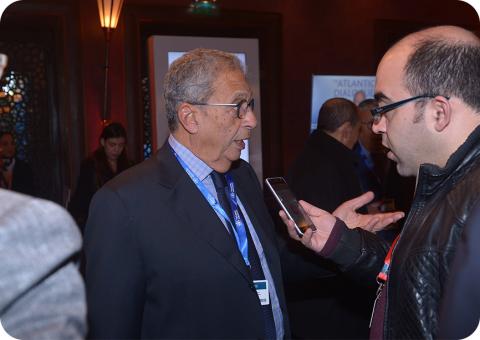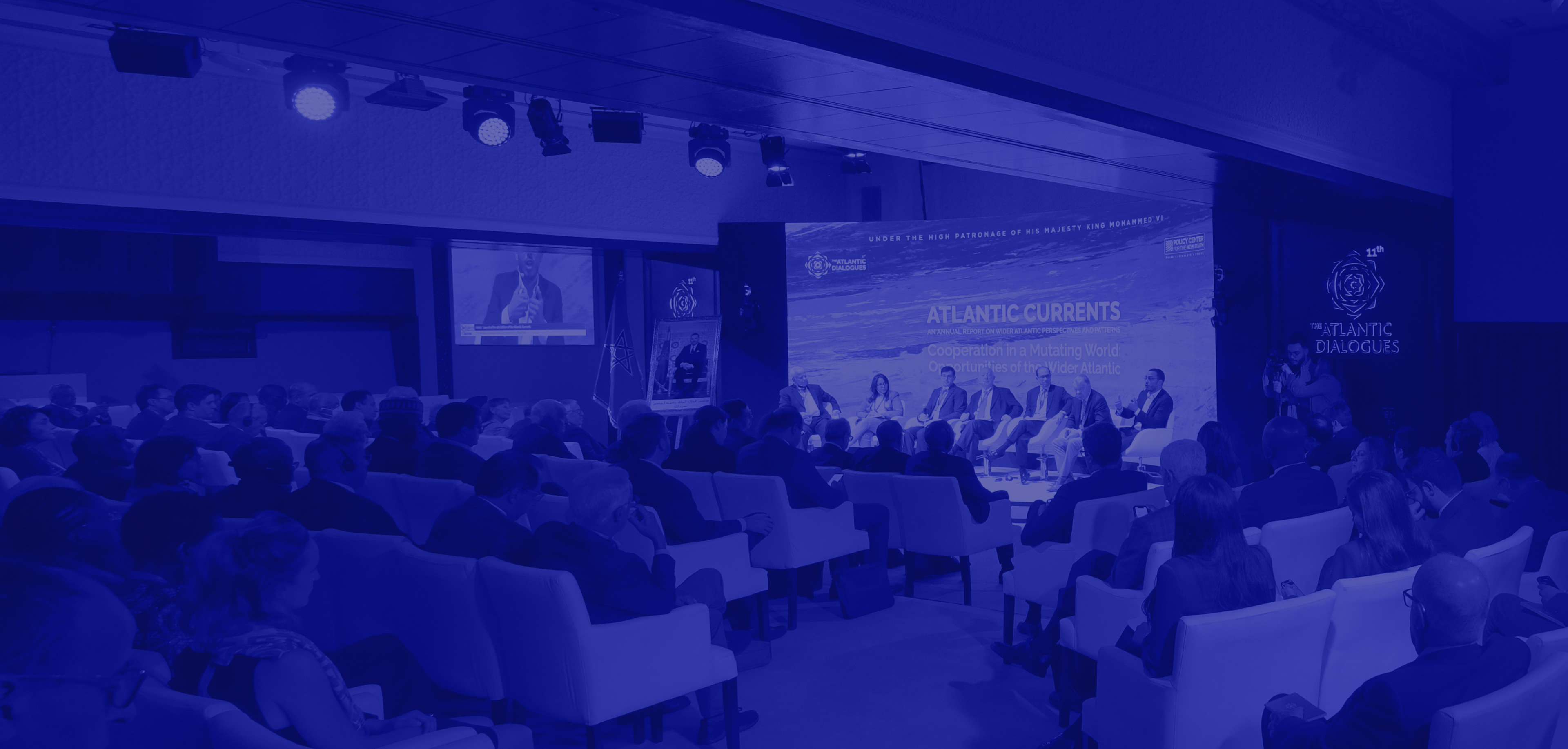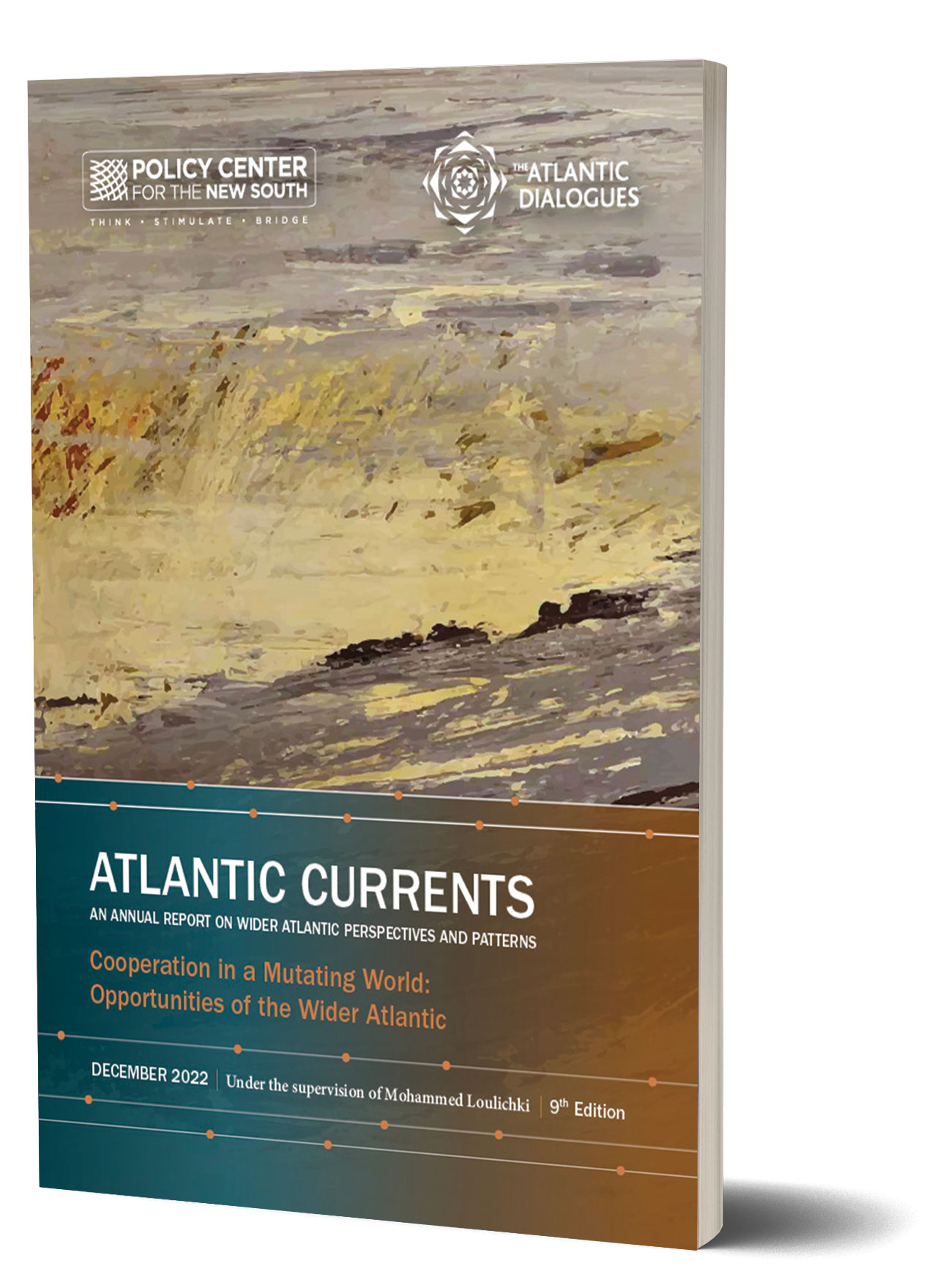
This ninth edition of “Atlantic Currents” appears in an international context marked predominantly by a ten month-war between Russia and Nato members that began February 2022. The war is affecting not only


14-16
December, 2023
Marrakesh, Morocco
The Policy Center for the New South will be holding the 12th edition of The Atlantic Dialogues, its annual high-level international conference, from December 14th to 16th in Marrakech, Morocco. The Atlantic Dialogues is an annual high-level gathering of influential public and private sectors leaders from around the Atlantic Basin for open, candid and informal discussions on cross-regional and cross-sectoral issues.
Launched in 2012, The Atlantic Dialogues have reached a milestone since they have been running for over a decade. The initial vision was to underscore the growing importance of Africa and Latin America as actors in the Southern Atlantic space by transforming mindsets, mental maps and narratives. Many editions that ensued have addressed key strategic issues with over 400 participants each year from Africa, Latin America, Europe and North America, former presidents and ministers, representatives of major institutions, CEOs, experts and seasoned African, European and US journalists to anchor the panels.
Following the discussion in 2022 on “Cooperation in a Mutating World: Opportunities of the Wider Atlantic” to explore renewed collaboration in times of crises, the AD community will convene again to reflect on what assertiveness can mean for the Atlantic, and what a more assertive Atlantic can mean for the world. To this end, the 2023 edition of the conference will focus on the following theme, "A More Assertive Atlantic: Its Meaning for the World”.
The idea of a more assertive Atlantic is at the root of a number of economic, political and security trends that have the potential to significantly impact on the world. A deeper understanding of the meaning and potential implications of this new perception of the Atlantic Basin is needed, as it marks a shift in the dynamics of the region. Understanding this phenomenon requires exploring different perspectives from Africa, Europe and the Americas.

This ninth edition of “Atlantic Currents” appears in an international context marked predominantly by a ten month-war between Russia and Nato members that began February 2022. The war is affecting not only
Morocco has two coastlines totalling a length of 3500 km, of which around 3000 give access to the Atlantic. This strategic geographical asset has the potential to turn the country into a crucial meeting point between the Americas and the rest of Africa. With distances shrinking due to the maritimization of the world, and the important opportunities in terms of economic cooperation, the Atlantic Ocean can also be considered as a space that bridges new narratives and perceptions of the developing world. In June 2022, Rabat hosted the 1st Ministerial Meeting of the African Atlantic States, an initiative aiming at laying the groundwork for a shared strategic vision and establishing a common African Atlantic identity. However, while stronger cooperation and better trade performance is on the agenda, addressing current security threats in the region remains an urgent priority. With recent discoveries of gas in the Southern Atlantic, new threats can quickly emerge with the rise of transnational crime and terrorist activities. As a result, the need for maritime security and cooperation among Atlantic states will become primordial with increased economic activity in the Atlantic.
- In what ways can Morocco exploit its geostrategic location to the fullest in its mission to promote maritime cooperation along the Atlantic coastline?
- How can these countries design a common framework to discuss and address security threats in the region and push for a Pan Atlantic partnership?
- How can Morocco capitalize on its transatlantic relations as a financial leverage to attract foreign aid and grow expertise that can be shared with the countries most exposed to the Atlantic’s emerging security challenges?
- How can the country move from security cooperation to a more consistent and comprehensive model able to revitalize transatlantic trade and enhance investor trust and interest in the region?
France and Morocco share much of their history and geography. They are not only Mediterranean countries but also Atlantic countries. They have both taken part in the processes of institutionalization and consolidation of solidarities in their respective continents, while working to build partnerships between Africa and Europe.
Considering the fragmentation and reorganization of the world, however:
- How do they view the major challenges facing the international community and humanity?
- What differences in perception are implied by their different positions in the concert of nations?
- How can these differences be acknowledged without undermining the possibility of cooperation for the common good(s)?
- What are the specific and shared principles that drive their external action?
The rise of inequality is becoming one of the biggest concerns for developed, developing and emerging economies. Nowadays, more than ever, it is becoming an extremely important issue facing many economies around the world, not only from an equity point of view but also from an economic and social perspectives.
The recent COVID-19 crisis has highlighted the weaknesses of the global economic system and has also put strong emphasis on the importance of the social state in fighting inequalities. Indeed, during this pandemic, we have seen that a large part of the population, mainly in the southern part of the Atlantic, has been left overnight without financial means to cover its basic daily needs. This situation has been aggravated by the low levels of access to social protection, and by the low qualification of workers in several economic sectors and in particular in the informal sector, which does not allow them to keep their job or to find a new one that can be carried out remotely from home.
- What is the role of social state in fighting inequality? what are the main policies that governments should prioritize, to help reduce within-country inequality and ensure that economic gains are well shared ?
- How can governments strengthen their capacity to raise the necessary tax revenues, in order to finance the social investment needed to reduce inequalities without discouraging economic activity?
- What is the cost of tax havens for developing countries and what role can international cooperation play in dealing with this issue?
- How can governance be made more effective to help fight within countries inequality?
The first half of 2022 witnessed one of the biggest shocks in the global food market in decades. As countries recovered from the COVID-19 pandemic, supply chains struggled to keep up with the growing demand for food and put pressure on prices. In addition, the war in Ukraine intensified record-high prices for food, fertilizer, and energy. As a result, the food price index has reached a record high, further threatening the food security of vulnerable countries, some of which are in the Atlantic basin, already fragile. Thus, the latest estimates show that 45 countries worldwide, including 33 in Africa, 2 in Latin America, and 1 in Europe, will need external assistance for food. Other exogenous challenges, notably climate change, increasing resource scarcity, and decreasing productivity, are also significant concerns. In facing these compelling challenges, policymakers must find solutions to create stronger, safer, more resilient communities. Improving the technological content of agricultural inputs and technical practices is essential to building this resilience, particularly in rural areas where the population is predominantly poor and vulnerable. This session explores solutions for building resilience to overlapping crises through a comprehensive and coordinated effort to align incentives, accelerate innovation, and scale up investment.
- In the current context of the price crisis, climate change, and food insecurity, what urgent solutions and actions are needed in the short term to overcome this crisis in the Atlantic?
- How could policy and incentive measures help address the impact of the food crisis in the Atlantic basin?
- What forms of collaboration, such as regional trade, agricultural research, and extension, should governments put in place to transform agriculture and strengthen national/regional food security?
The rise of geopolitical tensions in the world has added a new threat in the Sahel, an area already riddled with economic and security uncertainties. The withdrawal of European troops and the drastic reduction in the number of French troops has created a vacuum where the Sahelian states were already struggling to spread their administrative authority in their vast territories. The very concept of foreign intervention and its architecture in the case of the Sahel zone must be reformulated and reassessed in the light of recent events. Part of the answers require the empowerment of local armies and the establishment of regional peacekeeping mechanisms. These initiatives to expand counter-terrorism strategies still suffer from lack of funding and coordination. The efficiency of regional approaches and their coordination with other international entities and the question of the financing of these initiatives is at the heart of the new security deal in the Sahel. In that sense, an approach centered on economic development and the security-development nexus is insistently demanded by the States of the Sahel who reject a mere security and military approach.
- How can the current crisis be interpreted and how can regional initiatives like the G5 Sahel tackle the current security crisis?
- How can new approaches against violent extremism be implemented to help states stabilize their territories?
- How can long-term political stability be restored in the Sahel and the link ensured between security and development approaches?
An unprecedented threat to humanity, the climate crisis has been worsening for decades. Global warming is profoundly impacting the environment, the global economy, and the international peace and stability on which humanity depends. Food production, access to fresh water, and livable ambient temperatures are increasingly at risk. These crises create significant hardship and pose risks to all, but above all, to vulnerable developing countries. Today, many climate-related issues have become increasingly important areas for international cooperation, such as reducing methane emissions, building resilience to climate-related extreme weather events, prioritizing a green recovery from COVID-19, and the role of public financial institutions. However, while interests in addressing climate change may overlap, priorities often differ. In this sense, the issue of climate finance remains contentious but must be addressed to overcome lingering bottlenecks and accelerate adaptation and resilience to climate change.
- What is the current state of climate change cooperation in the Atlantic Basin?
- Will the “Loss and Damage” agreement, adopted during COP27, truly contribute to scaling up finance for climate action?
- How can countries overcome their differences to improve climate change cooperation?
The growing tensions in international relations that culminated in the war in Ukraine and the Sino-American rivalry put NATO and the dialectic of the transatlantic alliance back at the forefront of global strategic affairs. The 2022 Strategic Concept falls within this dynamic by confirming the intentions at consolidating the capabilities of NATO for the benefit of the defense and collective security of all the Allies. This adjustment leads us to consider the current period as a transition phase, and to rethink the Alliance's relationship with the enlarged Atlantic in the light of Cooperative Security. The Euro-Atlantic certainly has the strategic and economic means as well as the capabilities to occupy the preponderant place in the enlarged Atlantic space. On the other hand, the Latin American and Afro-Atlantic subgroups, marked by a long history of development and security research, are rising in power, as great emerging powers for some, due to their new global geopolitical postures and their desire for diplomatic and strategic autonomy. Therefore, the wider Atlantic cannot be reduced to a vast and simple space segmented between the Euro-Atlantic and the South Atlantic, but it must also be thought of as a relevant space for cooperative security and economic prosperity. However, there are still many questions as to how this could take shape in a world full of uncertainties.
- What is the South Atlantic’s room for manoeuvre?
- What are the intentions of the Atlantic Alliance?
- What are the consequences of the global powers’ play on the region?
- Are there opportunities for cooperation in the Wider Atlantic?
Whether a sign of a healthy democratic experience or that of a deep and generalized discontent, in recent years, the world has witnessed a multitude of protest movements. From the “Occupy” movement, the "Indignados", the social riots in some Latin American countries, the so-called “Arab Spring”, to the more recent “Gilets Jaunes” or “Antivax”, the world registered a clear increase in dissents since the financial crisis (2007-08). These social movements have clearly demonstrated the growing frustration from socioeconomic policies. They have also pointed at some dysfunctions in democracies in terms of good governance, political representation, and economic justice. Hence, with street power seemingly coming back at the center of world geopolitics, governments are increasingly brought back to the fundamentals of the balance between power and people. Governments are challenged by mass protests, social media polemics and even boycott campaigns that can sometimes lead to damaging instability.
- How can we preserve values of democracy in today’s mutating world?
- What’s at stake in today’s world governance?
- In an era of proven instances of manipulation and interference in news and social media, how can governments ensure freedom of expression while addressing these challenges?
The Atlantic Basin can be considered a relatively peaceful geopolitical space. However, unprecedented challenges in terms of policy planning and strategizing have had to be faced by South and North Atlantic states. The conjunction of sanitary, economic, and political crises has raised questions about the historical stability of the Atlantic Basin. It has also given traction to pre-existing populist and far-right movements in many parts of the northern Atlantic. Nonetheless, The Atlantic Basin as a fresh and untapped geopolitical space can serve as a new platform for a North-South dialogue. With the maritimization of the world and the expansion of international trade, the Atlantic Ocean can be considered like a river that can be bridged where new narratives and postures can emerge, when it comes to international relations and the perception of the developing world. The necessary synergy between economic growth and energy transition and the new paradigm for migration imposes a Pan Atlantic approach to these challenges and greater commitment to dialogue and cooperation.
- How can we change narratives around the Atlantic Basin and include a North-South dimension in the geopolitical framing of this territory?
- How can we strengthen cooperation and understanding between Southern Atlantic countries and the rest of the stakeholders ?
Inflation is back on the agenda. The rise of inflation occurred in the aftermath of the global activity rebound out of the COVID-19 when global value chains were severely disrupted and have been contending to recover since then. The Russia-Ukraine conflict added new strains over the global economy, raising energy and food prices. Inflation brings more uncertainty in the operation of an economy and introduces new transaction costs for economic agents, constrained to hedge against it. A more granular assessment indicates that vulnerable households were severely affected on two fronts. Their real disposable income shrunk while at the same time their savings slushed considerably, as their holdings are not generally inflation-immune. Besides, the aggressive reaction it generated from macroeconomic policy makers and its implications worldwide, this inflation trend could be the catalyst of ongoing transformations. It could strengthen even further the hand of those preaching globalization and advocating for self-reliance behaviors. In addition, inflation can also lead to questioning the balance of power between workers and capital holders, heralding a new era in labor markets negotiations.
- Are we heading toward a new inflation age?
- What are the drivers of today’s inflation and how similar/different is it from the 1970s?
- How can domestic policies cope with this issue? Can a collective international response prove to be effective?
- Beyond classic implications, can this inflation trend trigger more profound transformation of the worldwide economic system?